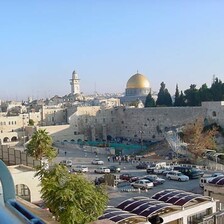Palestine 2 February 2006
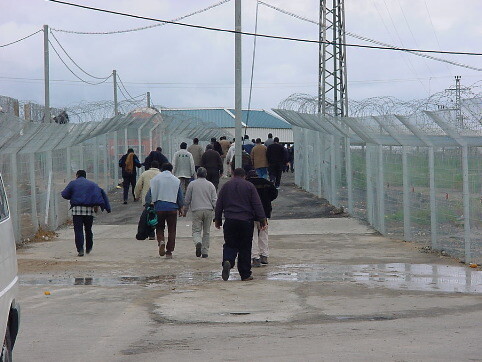
Palestinian day laborers returning to Gaza from Israel via Eretz Checkpoint.(Dienst)
9 March 2005 at the border crossing between Israel and northern Gaza I didn’t get into Gaza this time. I’m not completely sure why. Our delegation arrived at the border, disembarked the bus, entered the Israeli terminal, and surrendered our passports. Yesterday we had received word that our whole delegation had finally been accepted for travel into Gaza, after long deliberations. We had submitted our names through Israeli Physicians for Human Rights. This is the same protocol that I had used before sixteen months ago when I visited Gaza for 10 days.
Moving through the border had the same slowness as it did in November 2003. Initially the soldiers had trouble following the computer trail, with regard to the Physicians for Human Rights documents, the same reason for delay that I experienced previously. The delay went on for two hours, just like before. This time however, we were finally told that there were two names that were not on the list; mine and Nancy’s. Nancy is a Jewish-American nurse practitioner from Seattle. This is her first time in Israel and Palestine. We were the last two members to join the delegation, so perhaps there was a screw up and they did not receive the final list, even though it was submitted.
I’m feeling paranoid about possible alternative explanations. Is this bureaucratic ineptitude, or is there a motive behind it? I go through my bags and separate out the presents I am bringing to Dr. Eyad Sarraj and his colleagues at Gaza Community Mental Health Program: the clown noses, T-shirts, playing cards, pens and stickers for the children; the jazz CD for Dr. Eyad; some calendars of the Canadian Rockies, and the reprint of a 100-year-old Native American photo of the last chief of the Chilowist Tribe in Washington State with his family. I parcel all the gifts out to my friends in the Washington PSR delegation, who will carry them into Gaza on my behalf.
When I was in Gaza before, I wrote several articles critical of the hardships the people suffer, including house demolitions that I witnessed. They are now posted on a website. (See for example, “The Inherent Absurdity of our So-Called ‘War on Terror,’ or “From Jerusalem to Gaza via Eretz Checkpoint” which are linked to the website: www.columbiana.org.
If you put my last name & Palestine together, I get “Googled” real fast. I wonder if I am now on the blacklist, and poor Nancy is just along for the ride.
Have I been blacklisted? What will happen when we are separated from the rest of the group? After fumbling through my bags on the terminal floor to find the gifts going into Gaza, I am flabbergasted, and a bit panicky. I am sent back to the desk to pick up a piece of paper so I can disembark on the Israeli side of the checkpoint. I feel nervous. I leave the desk and then return, thinking that the soldiers have not given me back my passport. They say they can’t find it, and after a cold sweat, I discover it in my shirt pocket, right where it belongs! Part of the art of living in this part of the world is being appropriately paranoid, without being excessively so. We all miss the mark at times. That goes for Israelis, Palestinians, and also human rights activists.
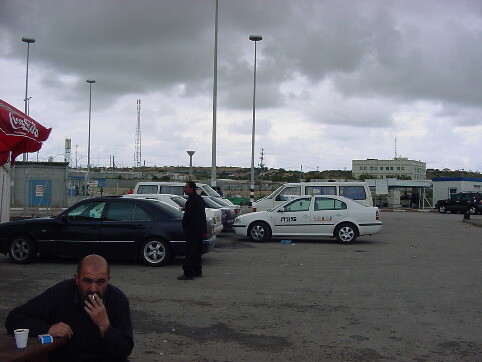
Kareem having coffee in the parking lot at Eretz Checkpoint on the Israeli side.(Dienst)
Nancy and I say goodbye to the rest of the delegation, who head on into Gaza. We turn back and walk 300 yards to the initial checkpoint where we hand our pieces of paper back to the guards, who clear us back into Israel. I give a sigh of relief when I see Kareem, our Jerusalemite Palestinian bus driver heading toward us.
We head up to Yad Mordechai, an Israeli truck-stop nearby, which handles truckers who travel between Tel Aviv and Gaza, and also commerce up from the Negev Desert. A flatbed trailer pulls up carrying a full-sized Israeli army tank, apparently coming out of Gaza. There is a flower farm next to the truck stop. Nancy and I journey out to see the flowers (next to the tank) as the drivers of the flat bed head in for a bite. We talk about maybe stealing a few flowers and sticking them in the end of the tank’s gun barrel; maybe this is not such a good idea.

Looking south toward Gaza at the smokestack of the coal fired powerplant on the Gaza-Israel border from the marina in Ashkelon, Israel (Dienst)
Kareem drives us into the nearby Israeli city of Ashkelon (Askalaan). Ashkelon is ancient, one of the five cities of the Philistines which as far back as 1200 BC. Today it is a modern Israeli city. We stop at a shopping mall. Our bags are inspected by a security officer, prior to entering the mall. We drive through the city. In one neighborhood, the signs are mostly in Russian, rather than Hebrew.
We head to the beach and the marina. We see surfers, and the vast blue Mediterranean Sea behind them. All of a sudden I get the feeling that I’m in San Diego. But Ashkelon is not quite the same as San Diego, and Gaza is much, much worse than Tijuana. Hispanic people, who cannot get across, can fall back into the vast interior of Mexico and Central America.
Gazans are not so lucky. They are trapped behind a wall dividing them from Israel, and an even bigger wall separating them from Egypt. They are locked in a giant open air prison, and can enter and leave only with great difficulty. We can see the giant smokestack of the Israeli coal-fired electric power plant on the southern end of Ashkelon, on the coast. It looks better from this side. A long causeway helps unload coal barges from Europe directly into the power-plant. You can see this same smoke stack from the beach in Gaza City. For many Palestinian children living in Gaza, this is the only visual image that they have of Israel … other than the tanks, the bulldozers, the armored personnel carriers, and the soldiers.
We return to Eretz Crossing. I pass the time having coffee in the parking lot with Kareem, and Abu Ali, a Bedouin driver from Beersheva (Be’ersaba’). I start taking pictures. There is definitely more traffic of Palestinian guest workers crossing the border than before.
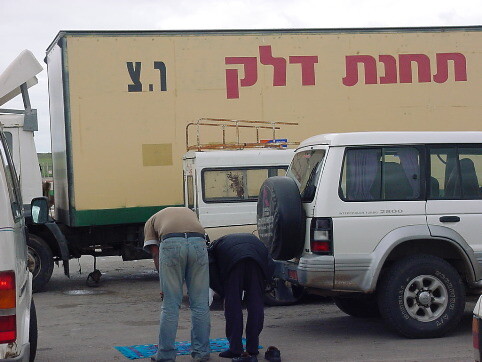
Palestinian laborers praying toward Mecca in the parking lot of Eretz Checkpoint on the Israeli side.(Dienst)
In November 2003, there was only myself and a Norwegian UN mission that crossed at Eretz during those two hours. There have been suicide bombings right here since then. Kareem heads back to the bus. Abu Ali explains the construction going on behind the fence. If all goes according to plan, there will be a train that will take Palestinians non-stop to Tulkarem in the West Bank, and Gazans will be able to visit the West Bank again, without being a security risk to the State of Israel. I guess this is diplomatic progress.
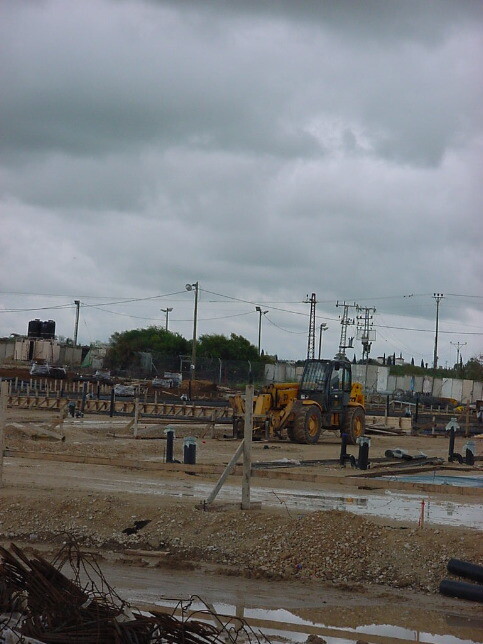
The train depot under construction at Eretz; Someday as part of a “peace plan” ’ trains may transport Palestinians from Gaza direct and non-stop to Tulkarem in the West Bank, without stoping in Israel.(Dienst)
But as we have seen in previous days, Ariel Sharon is loosening his chokehold on Gaza, with the unilateral disengagement plan, while simultaneously tightening his squeeze on the West Bank, with the building of the Apartheid Wall.
All of a sudden, an Israeli police jeep is driving right towards me with its blue lights flashing. Before it arrives, I jump back on the bus with my camera. I wait for a while, until the police jeep leaves the area, and then step down from the bus, this time without my camera. No point in pushing my luck, I’ve got enough pictures.
Our colleagues are due to return to the crossing at 4:30 pm, but now it is almost 7:00. It doesn’t surprise me that they are behind schedule, given the trouble we had going in. Nancy and I wait at the checkpoint in the dark, just at the edge of the spotlights.
A bus pulls up to the checkpoint full of Arab women and children. Kareem explains that they are families of prisoners returning to Gaza after visiting their loved ones. Once they leave Gaza, they can’t get off the bus until they get to the prison. There are no bathroom services on the bus. The same is true in reverse. Kareem has heard of prisoner’s families on the bus from the Northern West Bank to prisons in the Negev Desert for to three to four hours in each direction, just to visit their fathers and husbands for thirty minutes. After close inspection, the bus pulls through into Gaza.
I receive a call on my mobile phone. Our delegation is on the other side of the checkpoint and heading out. Forty-five minutes later, they finally clear the terminal and are heading toward us. We all wave. Once they clear the final gate, we embrace. A lot of my friends look very tired, with bewildered expressions on their faces.
Next, we tour the Old City of Jerusalem and visit the International Physicians for the Prevention of Nuclear War (IPPNW) - Israel in the charming town of Kafr Saba.
Dr. Bill Dienst is a rural family and emergency room physician from Omak, Washington, USA. In March 2005, he traveled to Palestine and Israel as part of a delegation sponsored by Washington State Physicians for Social Responsibility (WaPSR). The delegation met with prominent Palestinians as well as members of the Israeli peace movement. They also traveled inside the Kiryat Arba’a settlement to hear a prominent member of the settler movement. In this series of articles, Dr. Dienst describes these meetings. Dr. Dienst has been to Israel-Palestine twice before. In November 2003, he spent 10 days in Gaza sponsored by Gaza Community Health Programme, and in 1985, he spent 4 1/2 months in Egypt the West Bank and Gaza sponsored by the Palestine Red Crescent Society.





